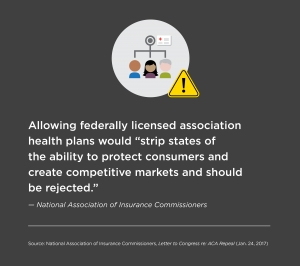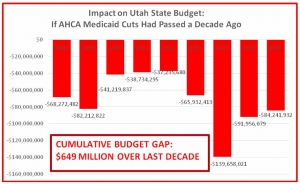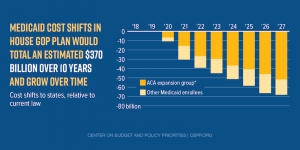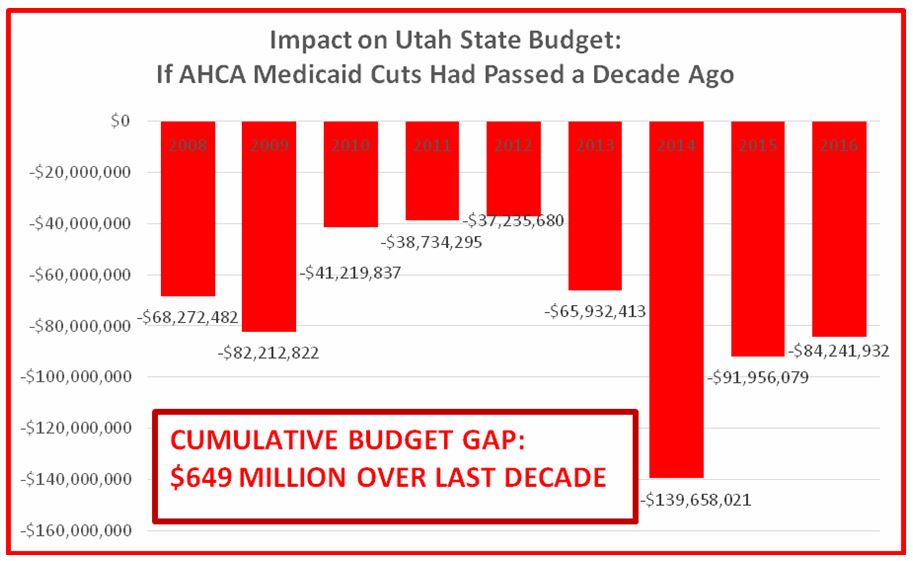Newsroom
Health
2017 Measures of Child Well-Being in Utah and the National Annie E. Casey Data Book Released
As Congress continues to debate changes to the ACA and our health care system, the health and well-being of millions of individuals and families remain at stake. A new report highlights the need for continued access to high-quality health insurance products, from the perspective of consumer advocates. The report, released by National Association of Insurance Commissioners Consumer Representatives, reviews the likely impact of proposed ACA repeal placement plans on consumers and state insurance markets. The report discusses:
- What consumers want when it comes to private health insurance;
- The progress that has been made in reducing the uninsured rate since 2010 and the risks of full or partial repeal of the Affordable Care Act;
- Key principles—such as insuring the same number of consumers with the same quality of coverage and minimizing market disruption—that we urge policymakers to apply when considering further changes to the market; and
- Concerns about the impact of potential changes on consumers and state markets, with an emphasis on high-risk pools, continuous coverage requirements, high-deductible health insurance products, association health plans, the sale of insurance across state lines, the loss of essential health benefits protections, and the need for continued nondiscrimination protections.
As a national NAIC Consumer Representative, Lincoln Nehring was one of the contributing authors on the report. The report urges Federal and State leaders to ensure that all consumers have continued access to quality, affordable health insurance. The full report, The Need for Continued Consumer Protections and Stability in State Insurance Markets in a Climate of Federal Uncertainty is available here: ![]() NAIC Report April 2017
NAIC Report April 2017
For 30 years now, Voices for Utah Children has called on our state, federal and local leaders to put children’s needs first. But the work is not done. The children of 30 years ago now have children of their own. Too many of these children are growing up in poverty, without access to healthcare or quality educational opportunities.
How can you be involved?
Make a tax-deductible donation to Voices for Utah Children—or join our Network with a monthly donation of $20 or more. Network membership includes complimentary admission to Network events with food, socializing, and opportunity to meet child advocacy experts. And don't forget to join our listserv to stay informed!
We look forward to the future of Voices for Utah Children and we hope you will be a part of our next 30 years.
Special thanks to American Express, our "Making a Difference All Year Long" sponsor. 
National Children's Organizations to Congress: Do No Harm
Dear Majority Leader McConnell, Speaker Ryan, Minority Leader Schumer, and Minority Leader Pelosi:
As organizations from every state and multiple fields dedicated to improving the well-being of children, we strongly urge you to keep the unique needs of children front and center and adopt a “do no harm” standard for children as you consider any changes to the nation’s health care system. Today, ninety-five percent of children in the United States have health coverage – an historic high – thanks in large part to the Affordable Care Act (ACA), Medicaid and the Children’s Health Insurance Program (CHIP). We must continue to move forward, not backwards for children, their parents and pregnant women. Preserving and expanding child appropriate health coverage and access to quality care for children with special needs in school or in other child-serving systems will impact children’s opportunities to succeed. Unfortunately, the American Health Care Act would move children backwards.
To meet the “do no harm standard” for children, we stand united in urging you and the full Congress to:
- Preserve and protect Medicaid’s funding structure that guarantees poor and low-income children and children with disabilities coverage for the services and treatment they need to survive and thrive. Reject the per capita cap proposed for Medicaid in the American Health Care Act that will over time deny children critical care and disadvantage them throughout their lives. Any change to Medicaid disproportionately affects children, who constitute nearly half of Medicaid recipients – 37 million today. Over time the cap will also harm Medicaid’s comprehensive prenatal care for income eligible pregnant women in every state, including many high-risk pregnancies and coverage for nearly half of all births annually in the U.S. Medicaid also helps schools, child welfare agencies and other child serving systems get children the special help they need. All of this will be in jeopardy. Capping Medicaid spending does not create cost efficiencies; instead, it shifts costs from the federal government to states, counties, local communities, beneficiaries and providers. Such cost shifts will inevitably result in loss of or limits on health coverage for children and other vulnerable populations.
- Protect the ACA’s Medicaid expansion and continue coverage for low-income parents. More than 11 million low income adults in 31 states and the District of Columbia are benefitting from expanded Medicaid under the ACA. Covering parents improves children’s access to health insurance and health care. The Medicaid expansion has resulted in improved access to mental health and substance abuse treatment, especially critical now with the opioid crisis affecting families across the country. When parents get treatment for their own health and mental health problems, it strengthens children’s developmental outcomes. The requirement for mental health and other essential health benefits for these parents will be eliminated if the American Health Care Act moves forward.
Investing in the health of children through consistent affordable health coverage yields a significant return on investment. Identifying and treating conditions early, before they become expensive long-term liabilities, is effective. Children with health coverage are more likely to attend school, graduate from high school, go to college, and become healthier adults, with higher taxable earnings than uninsured children. Ensuring children and their parents have access to the medically necessary services they need from providers trained to serve children is critical to positive outcomes. Medicaid helps child-serving systems ensure children quality health care:
- Early Childhood: Quality health coverage and care are essential for healthy brain development in children’s early years, the years of greatest brain development. Early childhood teachers can help children learn and develop, but need help to provide the basic early intervention services children with special needs require to thrive. The ACA and Medicaid also help child care providers and other caregivers get health coverage to keep themselves healthy and able to care for others’ children.
- Education: Since child health impacts educational attainment, any structural changes to Medicaid or loss of ACA coverage would compromise returns on major investments in children from Early Head Start to college. Medicaid reimburses schools for services delivered to children and the specialized staff who provide them, especially for children with disabilities, and also for students who get critical health services at school, such as vision and hearing screenings.
- Child Welfare: Medicaid offers treatment for substance abuse and mental health disorders that can otherwise result in children entering the child protection system and keeping them there. It helps state and local agencies get treatment to children in foster family homes, children with special needs in residential treatment, children who move from foster care to guardianship, and those with special needs adopted from foster care. It also provides therapeutic case management, co-location of health experts in child welfare offices, services and treatment for children in foster care with multiple complex needs and often their parents that help shorten their stays in foster care and reunite families.
- Juvenile Justice. While Medicaid cannot be used to care for youth in detention, it is an essential sometimes life-saving support for some youths with significant health or mental health needs as they transition out of detention and return to their family and community. It can help strengthen communities by preventing juveniles from re-offending.
We call on you and your colleagues in Congress to protect children’s health coverage as you consider the American Health Care Act and any reforms to the ACA and Medicaid. Any changes that move backwards and make children worse off by depriving them of comprehensive and affordable child-appropriate coverage will jeopardize not only their futures but the nation’s future economic and national security. We urge you to commit to build on the progress made over the past five decades to expand and improve health coverage for children, and, at a minimum, to “do no harm.”
Sincerely, Voices for Utah Children and other National Organizations
For a complete list of signing organizations, see the printer friendly versions:
 March 30, 2017 is Love UT Give UT!
March 30, 2017 is Love UT Give UT!
It’s a day for Utahns to give to the nonprofits that make Utah special. Every donation to Voices for Utah Children through Love UT Give UT gives Voices a chance to win matching grants and prizes—and gives you a chance to win a car!
And you don't have to wait! Donate now at http://bit.ly/loveUTchildren.
For 30 years now, Voices for Utah Children has called on our state, federal and local leaders to put children’s needs first. But the work is not done. The children of 30 years ago now have children of their own. Too many of these children are growing up in poverty, without access to healthcare or quality educational opportunities.
How can you be involved?
Make a tax-deductible donation to Voices for Utah Children—or join our Network with a monthly donation of $20 or more. Network membership includes complimentary admission to Network events with food, socializing, and opportunity to meet child advocacy experts. And don't forget to join our listserv to stay informed!
We look forward to the future of Voices for Utah Children and we hope you will be a part of our next 30 years.
Special thanks to American Express for sponsoring our 30th Anniversary Year. 
Save Medicaid Utah, a coalition whose members include AARP Utah, the Disability Law Center, Utah Family Voices, the Utah Health Policy Project, and Voices for Utah Children, has formed to advocate for preserving and strengthening Medicaid at a time when its viability is under attack in Congress. At stake is the health, well-being, and quality of life of over 320,000 individuals and working families in Utah – including more than 198,000 children, almost 16,000 seniors, and over 34,000 persons with disabilities.
“Medicaid supports our most vulnerable friends, neighbors, and family members,” says Micah. Vorwaller, Health Policy Analyst and Legislative Counsel with the Utah Health Policy Project. The Congressional Budget Office estimates the American Health Care Act (AHCA) will cut $880 billion from Medicaid over the next decade. As a result, some 14 million Americans will likely lose access to quality and affordable care over the same period. “With that size of a cut, many poor Utahns will undoubtedly lose coverage,” Vorwaller said. The House plans to vote on the legislation sometime tomorrow, March 23rd.
In addition to the cuts directly related to this drastic funding loss, the AHCA undermines the successful 50-year state and federal partnership underlying Medicaid. The partnership has meant that, in good times and bad, the federal government has covered about 2/3 of the cost of care for eligible Utahns. However, a Voices for Utah Children analysis found that, if the caps or block grants proposed in the bill had been in place for the last 10 years, Utah would be facing an estimated $650 million shortfall today.
Such a prospect is especially scary for parents of the thousands of children who would lose their comprehensive benefits under the existing program. Gina Pola-Money, Director of Utah Family Voices, notes, “Many families of children with special health care needs have private health insurance but still have to utilize Medicaid for their unmet needs.” Similarly, Jessie Mandle, Senior Health Policy Analyst with Voices for Utah Children, emphasizes that, “Medicaid is the cornerstone of children’s health coverage; any cuts, block grants or caps will undermine the health and well-being of Utah children and families.”
Danny Harris, Associate State Director of Advocacy for AARP Utah, contends, “Providing a fixed amount of federal funding, as envisioned by the AHCA, could shift overwhelming costs to Utah taxpayers and families, who would be unable to shoulder the costs of care, harming some of Utah’s most vulnerable citizens at a time when their needs are increasing.” Faced with scarce resources and tough choices, the state may be tempted, or forced, to provide only bare-bones care to as few individuals as possible. Disability Law Center Public Policy Advocate, Andrew Riggle, worries, “We could see a rapid return to the dark days of mass institutionalization if services designed to help keep individuals in their home or community or be as independent as possible – like outpatient mental health care, group homes, in-home nursing, or personal care supports – disappear.”
Save Medicaid Utah encourages its constituencies to ask their representatives to oppose the AHCA, and to hold them accountable for their vote.
###
See printer friendly version:
![]() AHCA Could Have Deadly Consequences for Utah’s Most Vulnerable
AHCA Could Have Deadly Consequences for Utah’s Most Vulnerable
 March 30, 2017 is Love UT Give UT!
March 30, 2017 is Love UT Give UT!
It’s a day for Utahns to give to the nonprofits that make Utah special. Every donation to Voices for Utah Children through Love UT Give UT gives Voices a chance to win matching grants and prizes—and gives you a chance to win a car!
And you don't have to wait! Donate now at http://bit.ly/loveUTchildren.
For 30 years now, Voices for Utah Children has called on our state, federal and local leaders to put children’s needs first. But the work is not done. The children of 30 years ago now have children of their own. Too many of these children are growing up in poverty, without access to healthcare or quality educational opportunities.
How can you be involved?
Make a tax-deductible donation to Voices for Utah Children—or join our Network with a monthly donation of $20 or more. Network membership includes complimentary admission to Network events with food, socializing, and opportunity to meet child advocacy experts. And don't forget to join our listserv to stay informed!
We look forward to the future of Voices for Utah Children and we hope you will be a part of our next 30 years.
Special thanks to American Express for sponsoring our 30th Anniversary Year. 
Protect Utah Kids. Protect Medicaid
Testimonies from Utah Parents
Children will lose access to coverage and care because of Medicaid cuts in the ACA Repeal Bill.
The ACA Repeal bill proposes to slash $880 billion in Medicaid funding. These cuts and caps would decimate the Medicaid program and lead to:
- Thousands of Utah children without health coverage
- Cutbacks to critical health services & benefits for children, people with disabilities and seniors
- Limited access to needed medical care
Currently 63% of all Utah Medicaid enrollees are kids, over 200,000 children. Under the current Medicaid program, children have guaranteed comprehensive protections to make sure they can access the health care they need. These protections include a comprehensive benefit package known as Early Periodic Screening, Diagnosis and Treatment (EPSDT), which ensures that if a child is diagnosed with a condition, she or he can get the affordable treatment they need.
But Medicaid cuts in the ACA bill could eliminate EPSDST benefits, and rollback eligibility so thousands of children would lose Medicaid coverage. Medicaid reductions would lead to shortfalls in state budgets; states would be forced to cut benefits to kids, roll back eligibility, increase cost sharing, and deny children the comprehensive care they need to thrive.
We can’t let this happen. For over 50 years, Medicaid has provided foundational coverage to low-income children and children with disabilities. It is the safety net for families who have fallen on hard times and a crucial lifeline of support for families with children who have special health care needs.
Here is what some working Utah parents are saying about Medicaid:
“It would be very hard to get the necessary medical exams and treatment [without Medicaid]. But thank goodness we do.” – E., SLC
[Without Medicaid] we would have to go to emergency room.”
[Without Medicaid] we would be in trouble with medical bills.” – S. , Tooele
“Gave me piece of mind knowing I could take [my son] to the doctor if needed.” -T., West Valley City
[Medicaid] has helped us through 4 babies… it’s very stressful not having insurance because there’s always the feeling of ‘what if.’ – B., SLC
“With Medicaid, I know my kids will be ok.” -E., Herriman
“[Medicaid coverage] provided me with information and opportunities that I would not otherwise know about.” – S., Sandy
“[Medicaid] helped me while I was pregnant and helped me keep my son up to date with everything the first year.” –L., Kearns
“[Medicaid coverage meant] Just knowing I could get help when I needed it through my pregnancy.” -A., SLC
“Medicaid help[ed] my family excellent[ly] because now they have excellent health.” – M., West Valley City
Tell your Congressional Representative to oppose cuts and caps to Medicaid.
The health and well-being of Utah kids are at stake.
Rob Bishop
Jason Chaffetz
Mia Love
Chris Stewart
 March 30, 2017 is Love UT Give UT!
March 30, 2017 is Love UT Give UT!
It’s a day for Utahns to give to the nonprofits that make Utah special. Every donation to Voices for Utah Children through Love UT Give UT gives Voices a chance to win matching grants and prizes—and gives you a chance to win a car!
And you don't have to wait! Donate now at http://bit.ly/loveUTchildren.
For 30 years now, Voices for Utah Children has called on our state, federal and local leaders to put children’s needs first. But the work is not done. The children of 30 years ago now have children of their own. Too many of these children are growing up in poverty, without access to healthcare or quality educational opportunities.
How can you be involved?
Make a tax-deductible donation to Voices for Utah Children—or join our Network with a monthly donation of $20 or more. Network membership includes complimentary admission to Network events with food, socializing, and opportunity to meet child advocacy experts. And don't forget to join our listserv to stay informed!
We look forward to the future of Voices for Utah Children and we hope you will be a part of our next 30 years.
Special thanks to American Express for sponsoring our 30th Anniversary Year. 
Under Congressional Health Care Plan, Utah Stands to Lose Millions, New Estimates Show
Salt Lake City—A new analysis shows the impact that the Republican health plan bill, the American Health Care Act (AHCA), would have on Utah’s state budget. The report finds that the health plan’s proposed restructuring to the Medicaid program would lead to drastic cuts in federal funding.
The analysis, released today by Voices for Utah Children, examines retrospective data and the impact of the proposed Medicaid changes, had they gone into effect a decade earlier. The estimates find that Utah would have experienced a budget gap of $649 million over the last ten years. The report concludes that given inflation and rising health care costs, Utah can expect the budget gap for the coming years to significantly exceed what it would have been in the past.
As part of the AHCA, federal funding for the Medicaid program would be capped and states would receive a per capita allotment. States would get less federal funding than under current law and would expect to see cuts increase over time. To make up for the decline in federal dollars, Utah may need to cut benefits to Medicaid enrollees. Under the per capita cap scenario, states would not have funding for unexpected health care cost growth from disease outbreaks or new life-saving drugs.
“The GOP health plan shifts costs to states and forces our state lawmakers to choose which health care services vulnerable kids will—and will not—receive,” said Jessie Mandle, Senior Health Policy Analyst with Voices for Utah Children. “These are decisions health care providers should be making, not politicians.”
The AHCA changes Medicaid’s current financing structure. The state budget shortfalls that would result would lead to limits placed on the Medicaid program, such as a reduction in benefits, lower provider payments or fewer children covered. The report suggests that the proposed restructuring of the Medicaid program puts Utah children’s health care and coverage at risk.
Read the full analysis here:
Under the ACA Repeal Bill, Utah Medicaid Stands to Lose Millions over a 10-Year Period
###
 March 30, 2017 is Love UT Give UT!
March 30, 2017 is Love UT Give UT!
It’s a day for Utahns to give to the nonprofits that make Utah special. Every donation to Voices for Utah Children through Love UT Give UT gives Voices a chance to win matching grants and prizes—and gives you a chance to win a car!
And you don't have to wait! Donate now at http://bit.ly/loveUTchildren.
For 30 years now, Voices for Utah Children has called on our state, federal and local leaders to put children’s needs first. But the work is not done. The children of 30 years ago now have children of their own. Too many of these children are growing up in poverty, without access to healthcare or quality educational opportunities.
How can you be involved?
Make a tax-deductible donation to Voices for Utah Children—or join our Network with a monthly donation of $20 or more. Network membership includes complimentary admission to Network events with food, socializing, and opportunity to meet child advocacy experts. And don't forget to join our listserv to stay informed!
We look forward to the future of Voices for Utah Children and we hope you will be a part of our next 30 years.
Special thanks to American Express for sponsoring our 30th Anniversary Year. 
Under the ACA Repeal Bill, Utah Medicaid Stands to Lose Millions over a 10-Year Period
Congress’ health plan bill, the American Health Care Act, proposes a major restructuring to the Medicaid program. The proposal would cap the federal funding states receive on a per-Medicaid beneficiary basis, starting in 2020. Using retrospective data, Voices for Utah Children investigated the impact of these changes on Utah’s state budget, had they been enacted a decade earlier.
The chart below illustrates the Utah budget impact of the Medicaid per capita cap allotment, if it had gone into effect a decade ago. The scenario is based on the American Health Care Act and state Medicaid annual reports. Given inflation and rising health care costs, Utah could expect the budget gap for the coming years to significantly exceed what it would have been in the past.
The proposed Medicaid caps would be based on states’ per-beneficiary spending, set in fiscal year 2016, and would rise annually to match growth in the medical care component of the Consumer Price Index (M-CPI). States are already locked into their capped amount. However, according to Congressional Budget Office forecasts, Medicaid costs per beneficiary are expected to rise 0.2 percentage points faster each year than the capped amount.
Consequently, states would get less federal funding than under current law and could expect to see cuts growing each year.
States would be expected to make up any excess costs or cut benefits to enrollees. Any unanticipated health care cost growth, such as a Zika outbreak or a new opioid treatment drug, would not be accounted for in the federal per capita cap amount.
As retrospective data illustrate, Utah consistently would have less available funding for health care costs. Today over 200,000 children rely on Medicaid coverage, including children with special health care needs. The majority of Medicaid enrollees (63%) are children. The Congressional proposal would create situations where state lawmakers choose which health services vulnerable children are eligible to receive, and which services or benefits they will not be eligible to receive. These are decisions best left up to health care providers, not politicians.
The American Health Care Act puts children’s health care and coverage at risk. Changes to Medicaid’s financing structure through a per capita cap would create large shortfalls in Utah’s state funding. These shortfalls would inevitably lead to limits placed on the program, such as a reduction in benefits, cuts to provider payments or fewer children covered. This unprecedented restructuring of the Medicaid program puts Utah children’s health care and coverage at risk.
 March 30, 2017 is Love UT Give UT!
March 30, 2017 is Love UT Give UT!
It’s a day for Utahns to give to the nonprofits that make Utah special. Every donation to Voices for Utah Children through Love UT Give UT gives Voices a chance to win matching grants and prizes—and gives you a chance to win a car!
And you don't have to wait! Donate now at http://bit.ly/loveUTchildren.
For 30 years now, Voices for Utah Children has called on our state, federal and local leaders to put children’s needs first. But the work is not done. The children of 30 years ago now have children of their own. Too many of these children are growing up in poverty, without access to healthcare or quality educational opportunities.
How can you be involved?
Make a tax-deductible donation to Voices for Utah Children—or join our Network with a monthly donation of $20 or more. Network membership includes complimentary admission to Network events with food, socializing, and opportunity to meet child advocacy experts. And don't forget to join our listserv to stay informed!
We look forward to the future of Voices for Utah Children and we hope you will be a part of our next 30 years.
Special thanks to American Express for sponsoring our 30th Anniversary Year. 












